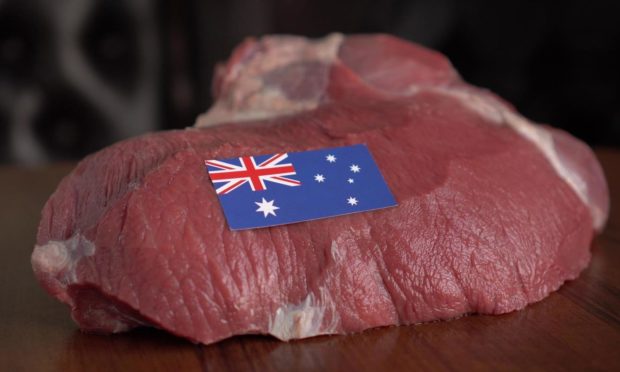Australian beef farmers are not looking to compete with British producers, according to a representative from the country’s red meat exports body.
Mary Johnson, market access manager at Meat and Livestock Australia – the Australian equivalent of Quality Meat Scotland – made the comments while giving evidence to the House of Lords International Agreements Committee.
The committee was taking evidence on the potential impact of a UK-Australia trade deal on the UK farming sector.
Ms Johnson said Australian trade negotiators were looking for a zero-tariff, zero-quota trade deal with the UK.
She said imports of Australian red meat to the UK were currently very low – they represented 0.5% of all beef imports and 14% of all sheepmeat imports in 2020.
“If British customers need high quality red meat products then we as Australian producers certainly would be happy to supply that demand,” Ms Johnson told the committee.
“We are not looking to compete against British producers but we just know that there’s a requirement in the market for imports and we want to be able to compete in that environment.”
Threat to UK farmers
The potential threat to UK farmers of a tariff-free, quota-free trade deal with Australia was highlighted by NFU director of trade and business strategy Nick von Westenholz.
He said any move to completely open up the market to imports of Australian red meat needed to be phased in and include safeguards to protect UK farmers.
Mr von Westenholz said the introduction of large quantities of Australian beef to the UK market would put downward pressure on the prices paid to UK farmers for their produce.
He added: “In many of these areas, they [Australian farmers] have significantly lower costs of production. And more actors in the UK market might put more pressure on prices.
“The NFU’s position on this is we support the government’s agenda on doing free trade agreements, What we want to do is ensure that there are safeguards to ensure that if the FTAs start damaging the sector, the government has something in its pocket to address that.”
Welfare concerns
Meanwhile, the RSPCA’s head of public affairs, David Bowles, told the committee he was concerned about the difference in welfare standards in countries the UK Government was negotiating trade deals with – including Australia.
He said: “I think the committee should ask the government how it intends the process to be to see if the FTA is undermining our animal welfare standards.”
Mr Bowles cited animal transport times as a stark difference in standards in the UK – he said the UK Government was consulting on a ban on live animal exports and a limit on transport times for livestock, while Australian livestock can be transported for up to 48 hours in some instances.
Ms Johnson defended Australian welfare standards and said: “We are confident that we meet the same [welfare] outcome as in the UK, but our approach might be different.”
The potential impacts of a UK-Australia trade deal on the British farming sector have been highlighted by farming bodies and politicians in the past few weeks.

